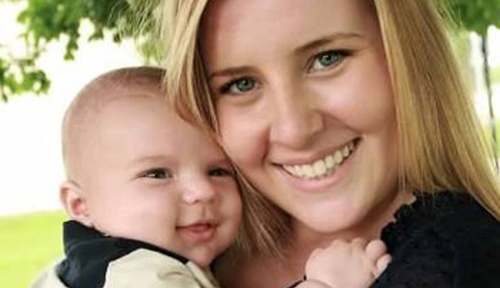It’s not often that those affected by breast cancer come face to face with researchers trying to find a cure for the disease.
It was an emotional experience for Brandi Preston, 22, and breast cancer researcher, San Ming Wang, M.D., associate professor of genetics, cell biology and anatomy, when they met after he spoke to Bright Pink, a support group for those affected by familial breast cancer.
“I use DNA material from patients to study, but that was the first time I had direct contact with patients,” Dr. Wang said. “I learned from them all how psychologically stressful it is to have a breast cancer gene — like carrying a time bomb. It was a good experience.
“What we’re doing is trying to save peoples’ lives in the long run. It’s not so simple anymore to think of my research work as just science. I hope our observation can be applied to benefit patients as soon as possible,” Dr. Wang said.
Preston said meeting Dr. Wang gave her hope for the future.
Preston’s genes means she has decided to get a double mastectomy.
The women in Preston’s family have a history with the BRCA 1 gene, which was carried by her mother, grandmother, great-grandmother and great-great-grandmother. Breast and ovarian cancer struck the two oldest generations and skipped the grandmother.
But, Preston’s mother was diagnosed with breast cancer and died at the age of 40. Two years earlier, the family found out there was a test to see if the cancer was hereditary. Before she died, Preston’s mother asked Brandi to get tested when she turned 19. She did, and was found positive for BRCA I.
Physicians and preventive care are now part of Preston’s life. Every six months she gets a breast exam, then an annual breast MRI, ovarian screening and a pap smear.
“If my mom had known she had this gene, she could have done so many things,” Preston said.
Preston, whose brother also is positive for the BRCA I gene, knows that with each passing generation, the disease strikes 10 years earlier.
That means she could be diagnosed with the disease at age 25 — in three years.
There’s an 87 percent chance. “After each breast exam I say ‘whew, no cancer, I’m good for another 6 months.’ But why wait until I develop it? That’s why I’m having the double mastectomy. It’s better to be proactive with my health rather than reactive.
“I look forward to watching Peyton participate in school activities, graduate high school, go to college, get married and start a family. All things my siblings and I didn’t get to experience with our mother.”
On the day of her operation, Preston’s entire family will be on campus for support and to participate in a comprehensive genomic study that crosses multiple generations. “This is a rare opportunity to study the genetic basis of familial breast cancer in one family,” Dr. Wang said.
Preston wants others to know about Bright Pink, the only national non-profit organization focusing on the prevention and early detection of breast and ovarian cancer in young women.
“No one really knows what it is like to have this gene,” Preston said. “Bright Pink empowers us to reach out and help others. Before, we just waited to hear about new research studies.”
